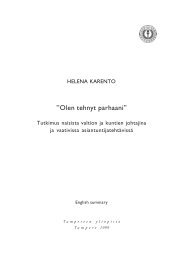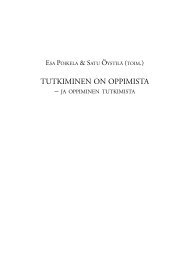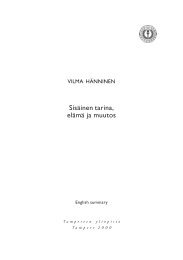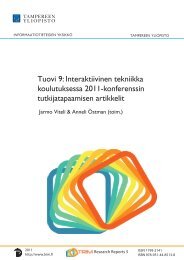Note on this edition: this is an electronic version of the 1999 book ...
Note on this edition: this is an electronic version of the 1999 book ...
Note on this edition: this is an electronic version of the 1999 book ...
Create successful ePaper yourself
Turn your PDF publications into a flip-book with our unique Google optimized e-Paper software.
224Dem<strong>on</strong>ic Texts <strong>an</strong>d Textual Dem<strong>on</strong>spresence was. A Mercerite sensed evil without underst<strong>an</strong>ding it. Put in <strong>an</strong>o<strong>the</strong>rway, a Mercerite was free to locate <strong>the</strong> nebulous presence <strong>of</strong> TheKillers wherever he saw fit. For Rick Deckard <strong>an</strong> escaped hum<strong>an</strong>oid robot,which had killed its master, which had been equipped with <strong>an</strong> intelligencegreater th<strong>an</strong> that <strong>of</strong> m<strong>an</strong>y hum<strong>an</strong> beings, which had no regard for <strong>an</strong>imals,which possessed no ability to feel emphatic joy for <strong>an</strong>o<strong>the</strong>r life form’s successor grief at its defeat – that, for him, epitomized The Killers. 97The exclusi<strong>on</strong> <strong>of</strong> machines from “natural” hum<strong>an</strong> identity in Dick’snovel does not amount to a denial <strong>of</strong> heterogeny. As <strong>the</strong> Mercerites identifywith <strong>the</strong> passi<strong>on</strong> <strong>of</strong> Wilbur, <strong>the</strong>y become aware <strong>of</strong> <strong>the</strong>ir deep unity with <strong>the</strong>o<strong>the</strong>r sentient beings, hum<strong>an</strong>s <strong>an</strong>d <strong>an</strong>imals. The merged state <strong>is</strong> polyph<strong>on</strong>ic:“He [<strong>the</strong> Mercerite] experienced <strong>the</strong>m, <strong>the</strong> o<strong>the</strong>rs, incorporated in <strong>the</strong> babble<strong>of</strong> <strong>the</strong>ir thoughts, heard in h<strong>is</strong> own brain <strong>the</strong> no<strong>is</strong>e <strong>of</strong> <strong>the</strong>ir m<strong>an</strong>y individualex<strong>is</strong>tences.” 98 Because <strong>the</strong> empathy box <strong>is</strong> also, after all, a piece <strong>of</strong>technology, <strong>the</strong> merger through it <strong>is</strong> also interwoven with ambivalence <strong>an</strong>dheterogeneity. In a gesture opposing <strong>the</strong> cognitocentric bias, mere intelligence<strong>is</strong> not enough to classify some<strong>on</strong>e as truly living; c<strong>on</strong>necti<strong>on</strong> to o<strong>the</strong>rlife <strong>is</strong> needed. Android’s relati<strong>on</strong> to l<strong>an</strong>guage <strong>is</strong> <strong>an</strong>alogous to <strong>the</strong> desolatel<strong>an</strong>dscape surrounding Wilbur Mercer: <strong>on</strong>ly fragments <strong>of</strong> life remain, dead<strong>an</strong>d decomposed. Rick Deckard notes how <strong>the</strong> female <strong>an</strong>droid had no “emoti<strong>on</strong>alawareness, no feeling-sense <strong>of</strong> <strong>the</strong> actual me<strong>an</strong>ing <strong>of</strong> what she said.Only <strong>the</strong> hollow, formal, intellectual definiti<strong>on</strong>s <strong>of</strong> <strong>the</strong> separate terms.” 99 An<strong>an</strong>droid <strong>is</strong> <strong>the</strong> subject <strong>of</strong> technological word, or dem<strong>on</strong>ic aspects <strong>of</strong> l<strong>an</strong>guage– “perverse <strong>an</strong>d artful.” 100 When Deckard tries to fix <strong>the</strong> identity <strong>of</strong> <strong>on</strong>e <strong>an</strong>droid(Luba Luft), she c<strong>an</strong> masterfully exploit <strong>the</strong> <strong>an</strong>ti-communicative potentials<strong>of</strong> l<strong>an</strong>guage. 101 All <strong>the</strong> signifiers are detached from <strong>the</strong>ir intendedc<strong>on</strong>texts, <strong>an</strong>d <strong>the</strong> attempts <strong>of</strong> Law (Deckard) to capture <strong>the</strong> real identity <strong>an</strong>dreferent are deflected.According to <strong>the</strong> traditi<strong>on</strong>al logic <strong>of</strong> opposing dual<strong>is</strong>ms ‘male’ <strong>is</strong> associatedwith ‘reas<strong>on</strong>’ <strong>an</strong>d ‘good,’ whereas ‘female’ groups with ‘irrati<strong>on</strong>al’ <strong>an</strong>d‘evil.’ 102 In Do Androids Dream <strong>of</strong> Electric Sheep <strong>the</strong> unc<strong>on</strong>nected rati<strong>on</strong>ality<strong>is</strong> dem<strong>on</strong><strong>is</strong>ed, whereas a certain type <strong>of</strong> irrati<strong>on</strong>ality <strong>is</strong> treasured. The <strong>an</strong>droidsare both male <strong>an</strong>d female, but Deckard <strong>is</strong> most c<strong>on</strong>fused in h<strong>is</strong> relati<strong>on</strong>to <strong>the</strong> female <strong>an</strong>droids. The story <strong>of</strong> Deckard bears witness to <strong>the</strong> enduringcapacity <strong>of</strong> <strong>the</strong> dem<strong>on</strong>ic O<strong>the</strong>r to provoke rec<strong>on</strong>structi<strong>on</strong> <strong>of</strong> identity.The opening scene <strong>of</strong> <strong>the</strong> novel shows Deckard <strong>an</strong>d h<strong>is</strong> wife in <strong>an</strong> absurd argumentover <strong>the</strong> use <strong>of</strong> a “Penfield mood org<strong>an</strong>” – a device that artificiallym<strong>an</strong>ipulates <strong>the</strong> brain state to induce <strong>the</strong> desired emoti<strong>on</strong>. H<strong>is</strong> wife w<strong>an</strong>ts to97 DA, 27.98 DA, 18.99DA, 166-67.100 See <strong>the</strong> d<strong>is</strong>cussi<strong>on</strong> <strong>on</strong> Derrida <strong>an</strong>d writing in chapter three.101 “‘O nein,’ Luba broke in. ‘I wouldn’t be <strong>the</strong>re. That’s easy to <strong>an</strong>swer.’ – ‘That’s not<strong>the</strong> questi<strong>on</strong>!’ – ‘Did you get <strong>the</strong> wr<strong>on</strong>g questi<strong>on</strong>? But I underst<strong>an</strong>d that; why <strong>is</strong> a questi<strong>on</strong>I underst<strong>an</strong>d <strong>the</strong> wr<strong>on</strong>g <strong>on</strong>e? Aren’t I supposed to underst<strong>an</strong>d?’” (DA, 92.)102See above, chapter four.














